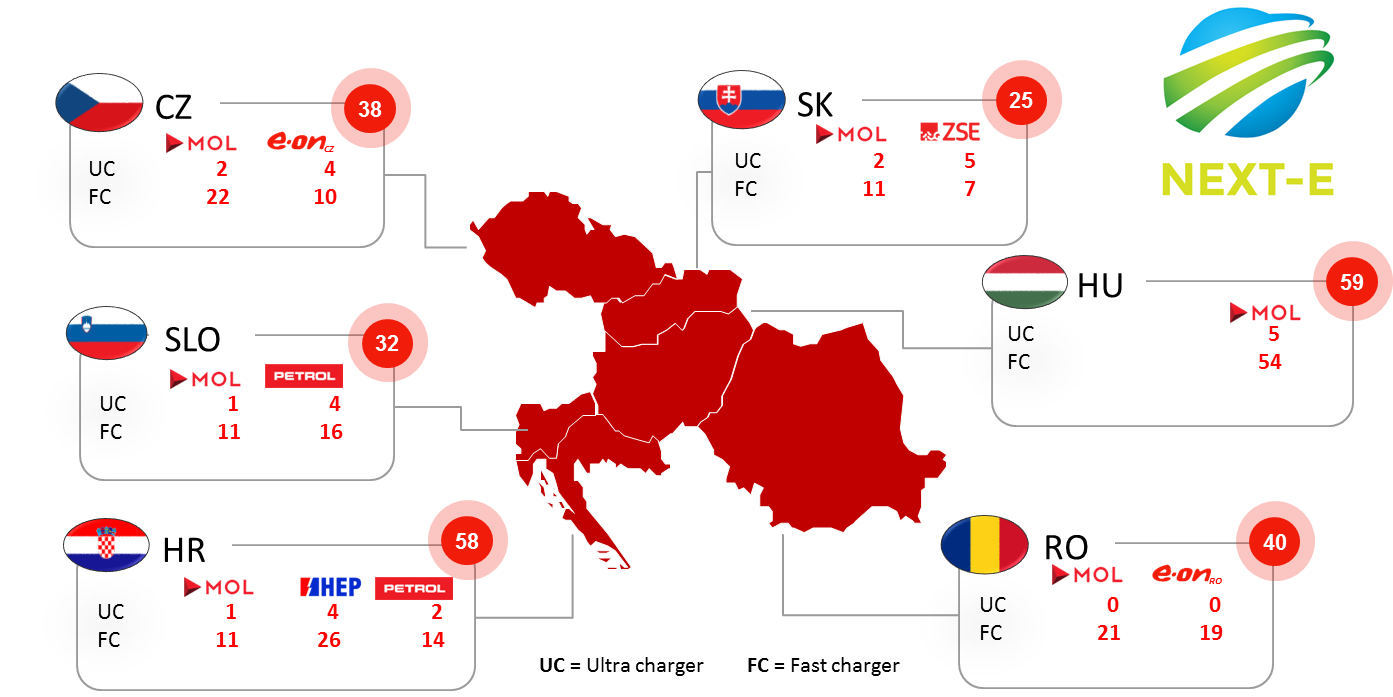Mol along with partners of Next-E consortium signed a grant agreement to deploy 252 EV chargers across CEE
- The network of 222 fast chargers and 30 ultra-chargers for EV (Electric Vehicles) will connect six countries in CEE along main roads in the EU’s core transport network.
- The largest grant ever given by the EU’s Connecting Europe Facility for any EV project, amounts to EUR 18.84 million.
- The NEXT-E network will be interoperable within the participating countries and connected to EV networks in Western Europe in order to create one integrated EU-wide charging network.
Budapest, 9th November 2017 – Today marks an important milestone in the e-mobility expansion in CEE and the future of European transportation. During the Digital Transport Days in Tallinn, MOL along with partners of the NEXT-E consortium signed a grant agreement with INEA which will enable the building of a charging network for EVs across six countries in Central and Eastern Europe: The Czech Republic, Slovakia, Hungary, Slovenia, Croatia and Romania.
In July 2017, the NEXT-E project was selected by the European Commission for co-financing through the Connecting Europe Facility (CEF). The NEXT-E consortium will be granted EUR 18.84 million to implement the project, which is the largest CEF grant ever awarded to an EV project. The NEXT-E project is a unique partnership of leading companies in the electricity and oil & gas sectors, as well as OEMs, who joined forces to create a charging network for electric vehicles along the main transport routes in Central and Eastern Europe. Besides MOL Group, the consortium consists of companies of E.ON Group, Hrvatska elektroprivreda in Croatia, PETROL (in Slovenia and Croatia), as well as Nissan and BMW.
Within the framework of this project, the consortium will install 222 multi-standard fast chargers (50 kW) and 30 ultra-chargers (150-350 kW) along the TEN-T corridors. The major part of the chargers will be located at MOL Group’s service stations in all six participating countries. For the first time ever long distance travel, based 100% on electricity, will be possible across six CEE countries, with connection to neighbouring countries.
Currently, EV charger deployments are scattered and often uncoordinated, posing a risk of overlaps or gaps in the network. The NEXT-E project was launched to address this challenge, and to create a continuous and cost-effective network that ensures the ability for long-distance and cross-border driving. The project will also leverage existing experience into countries without significant EV activities to date, such as Hungary and Romania. In order to ensure interoperability to the West and create a one fully connected network, the project will be coordinated with other ongoing CEF co-financed projects, i.e. ULTRA-E, EAST-E and FAST-E.
“Next-E is politically an essential innovation project, which took great efforts from industry and encouragement and support from the European Commission side to take place. In addition, the close collaboration with other neighbouring projects is evident, emphasising the maximizing European impact and dimension of the core network corridor policy. The objective of our policy is to finally allow citizens to travel with alternatively fueled vehicles across the entire EU.” - said Herald Ruijters, Director, DG MOVE, Directorate B - Investment, Innovative & Sustainable Transport, European Commission.
“I am proud that the EU and INEA will support a project that will kick off e-mobility in Central-Eastern Europe. With 252 electric charging points, 30 of which with very high capacity, the EU's core transport network will gain cross-border interoperability and a more open market for the benefit of consumers.” - said Dirk Beckers, Director of the Innovation and Networks Executive Agency (INEA) at the grant agreement signature ceremony.
The deployment of fast chargers is expected to start in 2018, while the installation of the ultra-chargers is planned for 2019 in order to prepare for the arrival of a new generation of long-distance EVs. The full deployment is expected to be concluded by the end of 2020.
The NEXT-E project is another milestone in the implementation of MOL Group’s long-term strategy, which is built on the premise that fossil fuel will eventually lose its monopolistic dominance in transportation. As a consequence, MOL Group aims to adapt to the changing market dynamics by building on its 10 million customer base, and transforming its traditional fuel retailing into a broader consumer goods and services business. As part of its strategy, MOL aspires is to take part in the reinvention of transportation in CEE and embrace such trends as car sharing, e-mobility, self-driving technology as well as alternative fuels.



